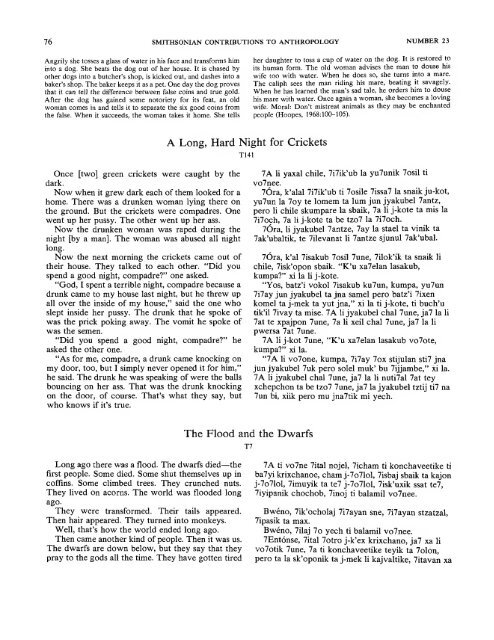PDF (Lo-Res) - Smithsonian Institution Libraries
PDF (Lo-Res) - Smithsonian Institution Libraries
PDF (Lo-Res) - Smithsonian Institution Libraries
Create successful ePaper yourself
Turn your PDF publications into a flip-book with our unique Google optimized e-Paper software.
76 SMITHSONIAN CONTRIBUTIONS TO ANTHROPOLOGY NUMBER 23<br />
Angrily she tosses a glass of water in his face and transforms him<br />
into a dog. She beats the dog out of her house. It is chased by<br />
other dogs into a butcher's shop, is kicked out, and dashes into a<br />
baker's shop. The baker keeps it as a pet. One day the dog proves<br />
that it can tell the difference between false coins and true gold.<br />
After the dog has gained some notoriety for its feat, an old<br />
woman comes in and tells it to separate the six good coins from<br />
the false. When it succeeds, the woman takes it home. She tells<br />
Once [two] green crickets were caught by the<br />
dark.<br />
Now when it grew dark each of them looked for a<br />
home. There was a drunken woman lying there on<br />
the ground. But the crickets were compadres. One<br />
went up her pussy. The other went up her ass.<br />
Now the drunken woman was raped during the<br />
night [by a man]. The woman was abused all night<br />
long.<br />
Now the next morning the crickets came out of<br />
their house. They talked to each other. "Did you<br />
spend a good night, compadre?" one asked.<br />
"God, I spent a terrible night, compadre because a<br />
drunk came to my house last night, but he threw up<br />
all over the inside of my house," said the one who<br />
slept inside her pussy. The drunk that he spoke of<br />
was the prick poking away. The vomit he spoke of<br />
was the semen.<br />
"Did you spend a good night, compadre?" he<br />
asked the other one.<br />
"As for me, compadre, a drunk came knocking on<br />
my door, too, but I simply never opened it for him,"<br />
he said. The drunk he was speaking of were the balls<br />
bouncing on her ass. That was the drunk knocking<br />
on the door, of course. That's what they say, but<br />
who knows if it's true.<br />
<strong>Lo</strong>ng ago there was a flood. The dwarfs died—the<br />
first people. Some died. Some shut themselves up in<br />
coffins. Some climbed trees. They crunched nuts.<br />
They lived on acorns. The world was flooded long<br />
ago.<br />
They were transformed. Their tails appeared.<br />
Then hair appeared. They turned into monkeys.<br />
Well, that's how the world ended long ago.<br />
Then came another kind of people. Then it was us.<br />
The dwarfs are down below, but they say that they<br />
pray to the gods all the time. They have gotten tired<br />
A <strong>Lo</strong>ng, Hard Night for Crickets<br />
T141<br />
The Flood and the Dwarfs<br />
T7<br />
her daughter to toss a cup of water on the dog. It is restored to<br />
its human form. The old woman advises the man to douse his<br />
wife too with water. When he does so, she turns into a mare.<br />
The caliph sees the man riding his mare, beating it savagely.<br />
When he has learned the man's sad tale, he orders him to douse<br />
his mare with water. Once again a woman, she becomes a loving<br />
wife. Moral: Don't mistreat animals as they may be enchanted<br />
people (Hoopes, 1968:100-105).<br />
7A li yaxal chile, 7i7ik'ub la yu7unik 7osil ti<br />
vo7nee.<br />
7Ora, k'alal 7i7ik'ub ti 7osile 7issa7 la snaik ju-kot,<br />
yu7un la 7oy te lomem ta lum jun jyakubel 7antz,<br />
pero li chile skumpare la sbaik, 7a li j-kote ta mis la<br />
7i7och, 7a li j-kote ta be tzo7 la 7i7och.<br />
7Ora, li jyakubel 7antze, 7ay la stael ta vinik ta<br />
7ak'ubaltik, te 7ilevanat li 7antze sjunul 7ak'ubal.<br />
7Ora, k'al 7isakub 7osil 7une, 7ilok'ik ta snaik li<br />
chile, 7isk'opon sbaik. "K'u xa7elan lasakub,<br />
kumpa?" xi la li j-kote.<br />
"Yos, batz'i vokol 7isakub ku7un, kumpa, yu7un<br />
7i7ay jun jyakubel ta jna samel pero batz'i 7ixen<br />
komel ta j-mek ta yut jna," xi la ti j-kote, ti buch'u<br />
tik'il 7ivay ta mise. 7A li jyakubel chal 7une, ja7 la li<br />
7at te xpajpon 7une, 7a li xeil chal 7une, ja7 la li<br />
pwersa 7at 7une.<br />
7A li j-kot 7une, "K'u xa7elan lasakub vo7ote,<br />
kumpa?" xi la.<br />
"7A li vo7one, kumpa, 7i7ay 7ox stijulan sti7 jna<br />
jun jyakubel 7uk pero solel muk' bu 7ijjambe," xi la.<br />
7A li jyakubel chal 7une, ja7 la li nuti7al 7at tey<br />
xchepchon ta be tzo7 7une, ja7 la jyakubel tztij ti7 na<br />
7un bi, xiik pero mu jna7tik mi yech.<br />
7A ti vo7ne 7ital nojel, 7icham ti konchaveetike ti<br />
ba7yi krixchanoe, cham j-7o71ol, 7isbaj sbaik ta kajon<br />
j-7o71ol, 7imuyik ta te7 j-7o71ol, 7isk'uxik ssat te7,<br />
7iyipanik chochob, 7inoj ti balamil vo7nee.<br />
Bweno, 7ik'ocholaj 7i7ayan sne, 7i7ayan stzatzal,<br />
7ipasik ta max.<br />
Bweno, 7ilaj 7o yech ti balamil vo7nee.<br />
7Entonse, 7ital 7otro j-k'ex krixchano, ja7 xa li<br />
vo7otik 7une, 7a ti konchaveetike teyik ta 7olon,<br />
pero ta la sk'oponik ta j-mek li kajvaltike, 7itavan xa

















